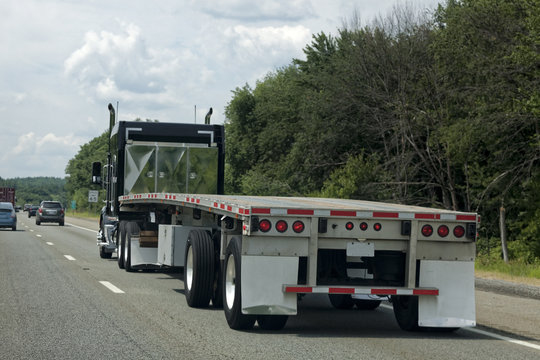
Conestoga trucking companies specialize in using Conestoga trailers—flatbed trailers equipped with a retractable tarp system that protects freight from weather and debris while allowing side or top loading. These trucks offer the versatility of a flatbed with the protection of a dry van, making them ideal for transporting machinery, steel, and sensitive freight across the USA.
What Is Conestoga Trucking
Conestoga trucking companies refers to freight transportation using Conestoga trailers—a hybrid between a flatbed and an enclosed trailer. A Conestoga trailer features a sliding tarp system mounted on rails, which can be rolled forward or backward to expose the cargo for loading and unloading. This system ensures both convenience and protection.
Unlike traditional flatbeds that require tarping by hand, Conestoga trucks allow drivers to cover or uncover freight in minutes without risking safety or damaging cargo. They are widely used by manufacturers, industrial suppliers, and logistics providers who value both efficiency and freight integrity.
Why Conestoga Trucks Are Preferred in Modern Freight
A Conestoga truck offers the flexibility of a flatbed combined with the protection of an enclosed trailer. This combination makes it one of the most sought-after equipment types in the U.S. trucking industry.
Protection and Safety
The retractable tarping system completely encloses the freight, shielding it from rain, snow, dust, and road debris. This is essential for high-value or delicate cargo like aerospace parts, industrial machinery, and finished steel.
Efficient Loading and Unloading
The curtain system can slide open from either side or the rear, allowing forklifts easy access without removing heavy tarps manually. This reduces loading times and increases overall productivity.
Compliance with Safety Standards
Conestoga trailers meet FMCSA regulations while minimizing the physical strain on drivers, lowering the risk of workplace injuries caused by manual tarping.
Types of Flatbed Conestoga Trailers
The term “flatbed Conestoga” generally refers to several trailer configurations designed to meet different shipping needs. Understanding the main types helps shippers choose the right equipment for their freight.
Standard Conestoga Flatbed
This is the most common design—essentially a forty-eight- to fifty-three-foot flatbed trailer with a sliding tarp system. It accommodates heavy and oversized cargo like lumber, building materials, and large equipment.
Step Deck Conestoga
A step deck Conestoga has two levels—an upper deck and a lower deck—allowing for taller cargo that exceeds standard height limits. It’s commonly used for machinery and industrial components.
Double Drop Conestoga
Designed for exceptionally tall or irregularly shaped freight, this version features a lower central deck that can handle extreme height loads while staying within federal transportation limits.
Advantages of Using a Flatbed Conestoga
Flatbed Conestoga trailers combine flexibility, efficiency, and safety in ways that traditional trailers cannot. Below are some of their top advantages.
Versatility Across Industries:
From automotive parts and aluminum coils to HVAC units and wind turbine components, Conestoga trucks handle almost any load type.
Time Efficiency:
With quick side and rear access, shippers and receivers save hours on tarping, inspection, and unloading processes.
Reduced Cargo Damage:
The tarp enclosure minimizes exposure to elements, preventing corrosion, moisture damage, or surface scratching.
Driver-Friendly Operation:
Drivers no longer have to climb loads or struggle with heavy tarps, reducing fatigue and improving safety compliance.
Professional Image:
Many U.S. carriers use Conestoga trailers to deliver high-value freight because they project a clean, professional image during transport and delivery.
Top Industries That Depend on Conestoga Trucking
In the USA, various industries rely on Conestoga trucking companies for reliable, protected freight delivery.
Manufacturing: Heavy machinery, automotive components, and assembly equipment require weatherproof hauling with quick turnaround.
Steel and Metal Fabrication: Conestoga flatbeds are ideal for transporting aluminum sheets, coils, or steel beams that must remain dry and free of corrosion.
Aerospace and Defense: Sensitive parts like aircraft panels, turbine blades, and precision components need both secure and flexible transportation.
Energy and Construction: Power generation components, solar panels, and wind energy parts benefit from Conestoga’s covered yet adaptable design.
Logistics and Supply Chain Services: Many third-party logistics providers (3PLs) in the U.S. integrate Conestoga trucks into their operations to offer versatile shipping options to clients.
What Makes Conestoga Trucking Companies Stand Out
The leading Conestoga trucking companies in the USA excel in efficiency, reliability, and specialized handling. Here’s what sets them apart:
Nationwide Coverage:
Top carriers operate extensive networks connecting major logistics hubs—Chicago, Dallas, Atlanta, and Los Angeles—ensuring coast-to-coast service.
Modern Equipment:
Fleet modernization with advanced Conestoga flatbeds helps ensure freight security and reduces downtime.
Skilled Drivers:
Certified, experienced drivers handle delicate or heavy freight with precision, following all FMCSA load-securing protocols.
Custom Freight Solutions:
Many carriers offer dedicated routes, expedited delivery, and real-time tracking, making them ideal partners for time-sensitive freight.
Choosing the Right Conestoga Trucking Company in the USA
When selecting a Conestoga trucking company, businesses should look beyond basic rates and focus on service quality and experience.
Fleet Size and Condition:
A reliable company maintains a modern, well-serviced Conestoga fleet equipped with advanced safety and tracking technology.
Safety Record:
Verify CSA scores, FMCSA safety ratings, and driver compliance. Safety-conscious carriers are less likely to experience delays or accidents.
Geographic Reach:
Choose a company that operates nationwide or within your target delivery regions, particularly major industrial corridors like the Midwest and Southeast.
Experience with Specialized Freight:
Companies familiar with your industry—such as aerospace or manufacturing—can handle complex loading requirements and provide custom solutions.
Transparent Pricing:
Top Conestoga carriers offer clear, itemized quotes and avoid hidden fees related to accessorial services.
Conestoga Truck vs Flatbed Trailer
A Conestoga truck and a standard flatbed trailer may look similar, but their functionality differs significantly.
Flatbed Trailer:
A traditional flatbed is open, requiring manual tarping to protect cargo. It’s ideal for non-sensitive, weather-resistant freight but can be labor-intensive.
Conestoga Truck:
A Conestoga includes a sliding tarp system that offers enclosed protection while maintaining the loading flexibility of a flatbed. This makes it the preferred choice for valuable or delicate materials.
In short, a Conestoga truck offers the best of both worlds: the accessibility of a flatbed with the security of an enclosed trailer.
The Cost and ROI of Conestoga Trucking
While Conestoga trucking can be slightly more expensive than standard flatbed shipping due to specialized equipment and limited availability, the benefits often outweigh the costs.
Reduced Damage Claims: The enclosed system prevents costly freight damage and insurance claims.
Faster Turnaround: Quicker loading and unloading improve operational efficiency and reduce detention fees.
Higher Cargo Value: The ability to haul sensitive or high-value products justifies the premium cost.
For many U.S. manufacturers and logistics companies, these advantages make Conestoga trucking a cost-effective, long-term investment.
The Role of Conestoga Trucking in U.S. Supply Chains
In today’s competitive logistics environment, Conestoga trucking companies play a vital role in ensuring consistent, damage-free delivery across American industries.
From Midwest factories to West Coast ports, these trucks handle critical loads that power the nation’s infrastructure, technology, and energy sectors. As the demand for specialized freight grows, Conestoga trailers are becoming indispensable to both national carriers and regional operators.
Future of Conestoga Trucking in the USA
The U.S. trucking industry is evolving rapidly with technological advancements and growing safety standards. Conestoga trucks are at the forefront of this change.
Adoption of Smart Telematics: Fleet managers are using GPS tracking and electronic load monitoring to optimize routes and ensure cargo safety.
Eco-Friendly Equipment: Newer Conestoga flatbeds are designed with aerodynamic features and lightweight materials, reducing fuel consumption and emissions.
Growing Demand from E-commerce and Manufacturing: As industries expand, so does the need for flexible yet protective freight options, fueling the continued growth of Conestoga trucking companies nationwide.
Conclusion
Conestoga trucking has become a cornerstone of modern American logistics—offering a unique blend of flexibility, safety, and reliability. Whether shipping heavy machinery across Texas, steel coils through Ohio, or precision parts to California, Conestoga flatbeds deliver unmatched protection and efficiency.
For shippers seeking dependable freight solutions, partnering with top-rated Conestoga trucking companies in the USA ensures every load arrives safely, securely, and on schedule. As the logistics landscape evolves, Conestoga trucks will continue to set the standard for innovation and performance in flatbed transportation.



